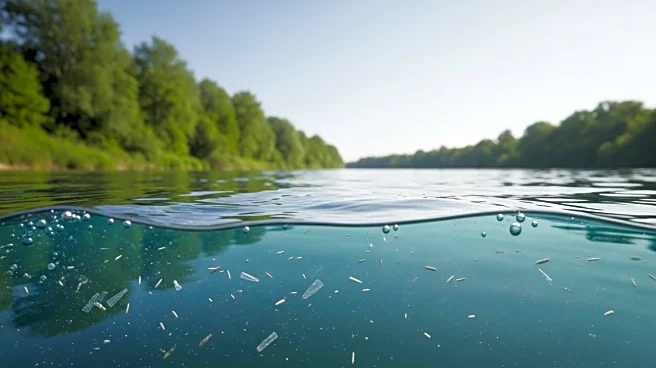What's Happening?
A recent study conducted by the Upper Itchen Restoration Community Interest Company, in collaboration with the University of Brighton, has revealed significant levels of microplastics in the River Itchen, a chalk stream of international importance. The study, which involved citizen scientists collecting water samples, identified various microplastic materials, including clothing fibers, tire particles, and fibreglass strands. Dr. Corina Ciocan, a principal lecturer in ecotoxicology at the University of Brighton, highlighted the chronic nature of this contamination, which is ongoing daily. The research aims to trace the sources of these pollutants, which are suspected to originate from poor boatyard practices and household washing machines not connected to mains drainage.
Why It's Important?
The discovery of microplastics in the River Itchen is significant due to the ecological importance of chalk streams, which are known for their biodiversity and abundance. The presence of these pollutants poses a threat to the unique ecosystems within these streams, potentially affecting aquatic life and water quality. This study underscores the broader environmental issue of microplastic pollution, which has implications for water management policies and practices. The findings could prompt regulatory bodies to implement stricter controls on sources of microplastic pollution, such as boatyards and household waste management systems, to protect these vital water resources.
What's Next?
The Upper Itchen Restoration Community Interest Company plans to continue its research to better understand the sources and impacts of microplastic pollution in the River Itchen. This ongoing study may lead to recommendations for policy changes or new initiatives aimed at reducing microplastic contamination. Stakeholders, including environmental agencies and local communities, are likely to be involved in discussions on how to address this issue effectively. The findings could also inspire similar studies in other chalk streams and water bodies, contributing to a broader understanding of microplastic pollution and its mitigation.
Beyond the Headlines
The study highlights the often-overlooked issue of microplastic pollution in freshwater systems, which are typically associated with marine environments. This research could lead to increased awareness and action regarding the environmental impact of everyday activities, such as laundry and boating, on freshwater ecosystems. It also raises ethical questions about the responsibility of individuals and industries in preventing pollution and protecting natural resources.










